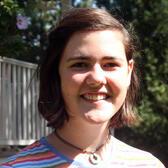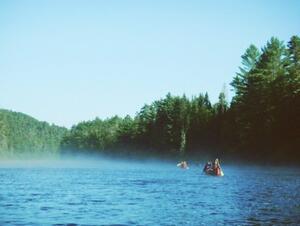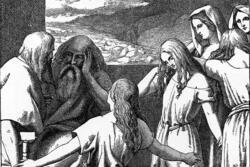Creation on a Canoe Trip
This past summer I attended a three-week-long canoe trip in Western Quebec. We set out to canoe white water and live completely in nature with a handful of tents, the clothes we were wearing, heavy containers filled with dehydrated food, and four red canoes. I had no idea what I was in for, and my only expectation was to learn more about the earth, and how I’m connected to it.
The trip, for me, had surprising and undeniable biblical connections. I felt more Jewish than I had ever felt in my life. Maybe it’s because I was the only Jewish participant, or that the trip occurred right after I’d been in Israel for two months. Either way, throughout the experience I was drawn to connections between the trip and the Torah; specifically, the creation story in the book of Genesis. Many moments in the creation story connected to my time on the river. These connections brought me comfort when I was so far from everything that defined me in my regular life at home.
In Genesis, the first day is defined as the day when light is created, and distinguished from darkness–“God said, ‘Let there be light’; and there was light. God saw that the light was good, and God separated the light from the darkness (Genesis 1:3-4).” My first day on the trail was marked by the power of light. The sunlight dazzled off the surface of the water as we departed from the dock. The first day was long, hot, and bright. We found a small rocky island and set up camp with the sun still high in the sky. We ate dinner as the sun set, and once night fell we entered our tents. Flashlight beams broke the darkness while we settled into our sleeping bags, and once the light clicked off we lay in the impenetrable darkness; the first day was over.
The fourth day in the creation story is marked by the creation of the moon and stars: “God made the two great lights, the greater light to dominate the day and the lesser light to dominate the night, and the stars… (Genesis 1:16).” On one of the days we saw the aurora borealis. We were still paddling when night had fallen. The enormous sky above the water was streaked with fantastically bright swaths of green and purple, and I was reminded of the phrase in Genesis when God describes the moon as the “lesser light.” Nothing about the aurora borealis seemed lesser to me, but it was undeniably one of the holiest experiences of my life.
The sixth day of the creation story describes the creation of animals and humans on the same day: “God said, ‘Let the earth bring forth every kind of living creature: cattle, creeping things, and wild beasts of every kind.’ And God said, ‘Let us make man in our image, after our likeness. They shall rule the fish of the sea, the birds of the sky, the cattle, the whole earth, and all the creeping things that creep on earth ... (Genesis 1:24-25).” I find it compelling that humans and animals are introduced on the same day. The detail about humans ruling over animals had never seemed strange to me until a particular moment on this trip.
As we rounded a corner in the river, I saw my friends in the boat ahead of me stop paddling. They turned around and wordlessly held their open hands up with their thumbs touching their temples (miming antlers), and mouthing the word “moose.” He was probably 30 yards away from us, and even from that distance we could feel the power of his presence. He crossed the river slowly as we silently looked on. This moment was the first time I had ever seen a wild animal larger than a deer in person. Over the course of the trip I would go on to see bald eagles, beavers, owls, and bears. There was nothing about my experiences with those animals that indicated I was in charge of them. The majestic power of these creatures, these divine creations, was immeasurable, and humbling.
On the final day of the creation story, we get Shabbat: “On the seventh day God finished the work that He had been doing, and He ceased on the seventh day from all the work that He had done. And God blessed the seventh day and declared it holy (Genesis 2:1-3).” I decided at the beginning of the trip that I would recognize Shabbat every week. On the first Friday, I stood by the water’s edge as dinner was being made. I covered my eyes and davened the Shabbat prayers, taking a break for the first time since the trip began. I took comfort in the only thing I had from the outside world–Judaism.
Every day I encountered a new experience on trail. There were many joyful and powerful moments, but also many moments when I felt afraid and lost. I looked forward to Shabbat the whole week, and used it to find comfort amidst an entirely new experience, and to reflect on all of the evidence of creation around me.
This piece was written as part of JWA’s Rising Voices Fellowship.








This made me cry, Julia. Judaism and nature are so powerful and their inter-connectivity is beautiful in every sense. Very well done!